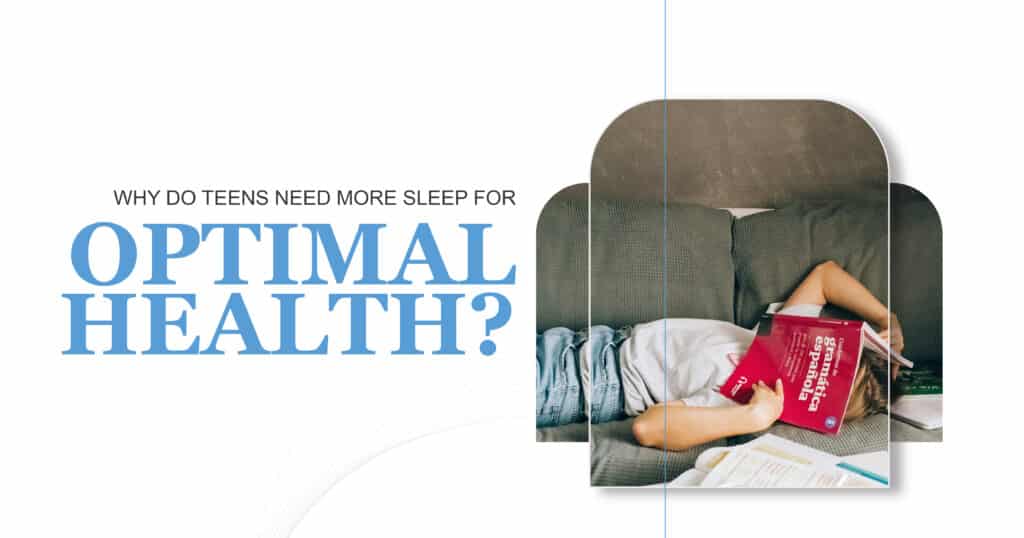Sleep plays a crucial role in adolescent development, yet many teens don’t get enough. So, why do teens need more sleep? As teens grow, their bodies and minds go through significant changes. Getting enough sleep during this phase is essential for their physical, mental, and emotional health. Sleep influences everything from cognitive function to emotional stability. In this article, we’ll explore the science behind why adequate sleep is so important for teens, especially those navigating through hormonal changes, school pressures, and personal growth. Let’s dive in and discover how sleep impacts teens and how Hillside Horizon for Teens can support your teen’s sleep and mental wellness.
The Science Behind Adolescent Development and Sleep
Adolescence is a developmental stage during which teens experience rapid changes in their brains and bodies. This developmental stage is crucial for building physical and cognitive foundations throughout adulthood. Sleep serves as the fuel that supports this growth. Adolescent development is tightly connected to sleep cycles, where deep and restful sleep helps the brain organize and process the day’s information.
Teens require more sleep than adults because their brains are still developing, and sleep supports this growth. According to research, adolescents need between 8 and 10 hours of sleep each night for optimal health.
Here’s a closer look at how sleep benefits teens in these areas:
- Growth Spurts. Sleep aids physical growth and tissue repair.
- Brain Development. Sleep helps the brain form new connections, strengthening cognitive function.
- Mental Health. Adequate sleep reduces the risks of anxiety, stress, and depression.

In short, sleep isn’t just a break from the day – it’s an essential time for the brain and body to grow and recharge.
Hormonal Changes and Their Impact on Sleep Patterns
As teens go through puberty, their bodies experience dramatic hormonal changes that directly affect their sleep patterns. One of the most significant hormones is melatonin, which controls the sleep-wake cycle. For teens, melatonin is released later in the evening than it is in adults, causing them to feel more awake later at night.
These changes lead to:
- Delayed Sleep Phase
- Sleep Disruptions
Impact of Hormonal Changes on Sleep Patterns
| Hormonal Effect | Description | Impact on Sleep |
| Delayed Sleep Phase | Melatonin is released later in the evening, making teens stay up later. | Teens tend to feel more awake at night and have trouble sleeping. |
| Sleep Disruptions | Hormonal activity can cause difficulty falling asleep or staying asleep. | Teens may experience more disrupted sleep, leading to insufficient rest. |
Understanding these hormonal shifts is crucial for addressing sleep challenges in teens. While these changes are natural, establishing good sleep habits is essential to overcome them.
Cognitive Function and the Role of Adequate Sleep
Cognitive function refers to mental processes like thinking, learning, and memory. Teens who don’t get enough sleep often struggle with concentration and information retention, which affects their school performance and daily lives. Adequate sleep improves brain function, enabling teens to focus better, solve problems more effectively, and retain what they learn.
Some key benefits of sleep for cognitive function:
- Memory Consolidation. Sleep helps teens remember what they’ve learned.
- Improved Attention. Getting enough sleep allows teens to focus better during the day.
- Decision Making. Rested teens can make decisions more quickly and accurately.
How Sleep Affects Academic Performance in Teenagers
Academic performance is significantly influenced by sleep. Teens who don’t get enough rest often struggle with grades and schoolwork. Sleep-deprived teens struggle to concentrate, stay alert in class, and complete assignments efficiently.
Here’s why sleep is important for academic performance:
- Focus & Concentration. Well-rested teens pay better attention and complete tasks more quickly.
- Problem-Solving. Sleep enhances creativity and problem-solving abilities.
- Memory Retention. Sleep consolidates what teens have learned, making it easier to recall information when needed.
Mood Regulation and Sleep: A Crucial Connection
Teens are already navigating emotional turbulence as they mature. Sleep plays a significant role in mood regulation, helping teens manage stress, anxiety, and irritability. A lack of sleep can lead to mood swings, frustration, and heightened emotional responses.
Key effects of sleep on mood:
- Improved Emotional Resilience. Sleep helps teens cope with stress and stay emotionally balanced.
- Reduced Risk of Depression. Sleep deprivation is linked to higher rates of depression in teens.
- Positive Outlook. Teens who sleep well tend to have a more optimistic outlook on life.
The Importance of Sleep for Physical Growth During Adolescence
Physical growth is another area where sleep plays a key role. Physical growth during adolescence is a time of rapid change. Teens grow taller, gain muscle mass, and undergo other physical changes. Sleep is critical during this time because it supports muscle repair, tissue growth, and overall physical health.
Benefits of sleep for physical growth:
- Tissue Repair. Growth hormones are released during deep sleep, promoting tissue and muscle growth.
- Energy Restoration. Sleep helps replenish energy levels for daily physical activity.
- Immune System Boost. Rest helps boost immunity, preventing illness.
Mental Health Benefits of Proper Sleep for Teens
Adequate sleep is a cornerstone of mental health. Teens who get enough rest are less likely to suffer from anxiety, depression, or other mental health challenges. Sleep helps teens maintain emotional stability, manage stress, and stay mentally resilient during tough times. Here are a few benefits of getting proper sleep for teens:
- Mental Clarity. Sleep sharpens focus and decision-making.
- Mood Regulation. A good night’s sleep ensures a more balanced and stable mood.
- Reduced Anxiety. Proper sleep lowers the risk of feeling anxious or overwhelmed.

Understanding the Teenage Sleep Cycle
The teenage sleep cycle is different from that of younger children and adults. Teens experience changes in both the timing and structure of their sleep, often leading to the need for more sleep to feel rested.
Teenagers spend more time in REM sleep, which is critical for emotional processing and memory consolidation. In addition to REM sleep, sleep duration and overall structure change during adolescence.
Teens need at least 8-10 hours of sleep each night to maintain optimal health, due to the changes in their sleep cycle.
Here’s a breakdown of how the sleep stages differ for teens:
| Sleep Stage | Description | Duration |
| REM Sleep | Teens spend more time in REM sleep, essential for emotional processing and memory consolidation. | Increased |
| Deep Sleep | This stage helps restore physical energy and repair tissues. | Decreased |
| Light Sleep | This is the transition phase between light and deep sleep. | Decreased |
| Total Sleep | Teens need at least 8-10 hours of sleep each night to maintain optimal health. | 8-10 hours recommended |
Rest, Grow, Thrive – Hillside Horizon for Teens Supports Teen Sleep and Mental Wellness
At Hillside Horizon for Teens, we understand that adequate sleep is crucial for physical and mental health. That’s why we emphasize the importance of healthy sleep habits for teens. Our programs focus on holistic wellness, integrating sleep support and therapeutic emotional and mental growth services.
If your teen is struggling with sleep or mental health issues, our dedicated team is here to help. We offer personalized care tailored to each teen’s unique needs, ensuring they get the right amount of sleep for optimal health.
Visit Hillside Horizon for Teens for more information or to schedule a consultation.
FAQs
- How do hormonal changes during adolescence affect sleep patterns in teens?
Hormonal changes during puberty, especially melatonin release, delay sleep onset in teens. This causes teens to stay awake later. The later sleep cycle affects their overall rest and health.
- What role does adequate sleep play in enhancing cognitive function in teenagers?
Adequate sleep boosts focus, memory, and problem-solving skills in teens. It helps with academic performance and daily tasks. Sleep strengthens brain connections, supporting better cognitive function.
- In what ways does sleep influence academic performance among adolescents?
Teenagers who get enough sleep have better concentration and memory. Sleep allows for quicker problem-solving and information retention, which results in improved academic performance and grades.
- How is mood regulation in teenagers connected to their sleep quality?
Poor sleep increases irritability and mood swings in teens. Quality sleep helps maintain emotional balance and reduces stress. Well-rested teens are better equipped to handle emotional challenges.
- Why is sleep crucial for physical growth and mental health during adolescence?
Sleep supports tissue repair and physical growth during adolescence. It helps regulate mood and reduces the risk of mental health issues. Adequate sleep is key for overall physical and psychological well-being.





